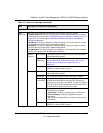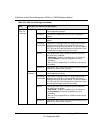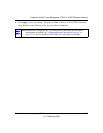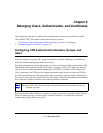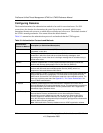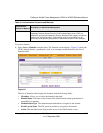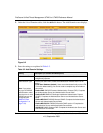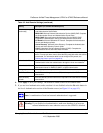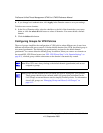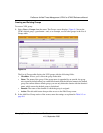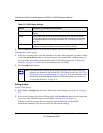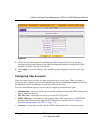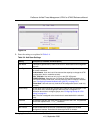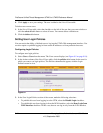
ProSecure Unified Threat Management UTM10 or UTM25 Reference Manual
Managing Users, Authentication, and Certificates 9-5
v1.0, September 2009
4. Click Apply to save your settings. The domain is added to the List of Domains table.
5. If you use local authentication, make sure that it is not disabled: select the No radio button in
the Local Authentication section of the Domain screen (see Figure 9-1 on page 9-3).
Authentication Type
(continued)(
• WIKID-CHAP. WIKID Systems CHAP. Complete the Authentication Server
and Authentication Secret fields.
• MIAS-PAP. Microsoft Internet Authentication Service (MIAS) PAP. Complete
the Authentication Server and Authentication Secret fields.
• MIAS-CHAP. Microsoft Internet Authentication Service (MIAS) CHAP.
Complete the Authentication Server and Authentication Secret fields.
• NT Domain. Microsoft Windows NT Domain. Complete the Authentication
Server and Workgroup fields.
• Active Directory. Microsoft Active Directory. Complete the Authentication
Server and Active Directory Domain fields.
• LDAP. Lightweight Directory Access Protocol (LDAP). Complete the
Authentication Server and LDAP Base DN fields.
Select Portal The pull-down menu shows the SSL portals that are listed on the Portal Layout
screen. From the pull-down menu, select the SSL portal with which the domain
is associated. For information about how to configure SSL portals, see
“Creating the Portal Layout” on page 8-18.
Authentication Server The server IP address or server name of the authentication server for any type
of authentication other than authentication through the local user database.
Authentication Secret The authentication secret or password that is required to access the
authentication server for RADIUS, WIKID, or MIAS authentication.
Workgroup The workgroup that is required for Microsoft NT Domain authentication.
LDAP Base DN The LDAP base distinguished name (DN) that is required for LDAP
authentication.
Active Directory
Domain
The active directory domain name that is required for Microsoft Active Directory
authentication.
Note: A combination of local and external authentication is supported.
Warning: If you disable local authentication, make sure that there is at least one
external administrative user otherwise access to the UTM25 is blocked.
Table 9-2. Add Domain Settings (continued)
Setting Description (or Subfield and Description)



